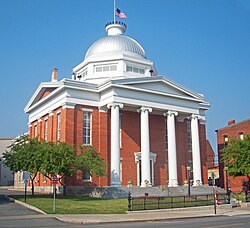Dissolution
In 2012, a coalition of bipartisan taxpayers formed OneLyons, a group seeking to dissolve the village. They circulated a petition to force a dissolution vote after the village did not follow up on a 2010 Center for Governmental Research Study showing that significant tax savings were possible and further efficiencies could be achieved. In November 2012, the village voted to dissolve, beginning a process under the 2009 NYS Government Reorganization and Citizen Empowerment Act pushed by Governor Cuomo and Championed by Senators Nozzolio and Robach as well as local Assemblyman Bob Oaks of North Rose.
In 2013, the Village of Lyons formed a dissolution committee and chose a consultant. Per NYS Law, the Village of Lyons had until June 25, 2013, to prepare and approve a dissolution plan, and until July 2 to present it to the village residents.
On June 28, 2013, the OneLyons group filed a petition in New York State Supreme Court requesting the court declare the village in violation of GML 17-A. Acting Supreme Court Judge Nesbitt held two hearings, and ordered the Village of Lyons to complete a dissolution plan by October 20, 2013.
OneLyons appealed Judge Nesbitt's decision granting additional time to the village citing the New York State Law and asserting that the judge did not have a legal basis to grant time extensions, and that the judge exceeded the discretion he was allowed by law. The Village of Lyons responded to the appeal by asking the NYS Supreme Court Appellate Division, 4th Judicial Department out of Rochester NY to dismiss the Appeal as Moot. On December 6, 2013, five judges of the Appellate Division decided the case had enough grounds and merit to move forward, ordered the Village of Lyons to reply, but reserved the right to still dismiss the case as moot. In 2014, the Appellate Court 4th Department in Rochester dismissed the lawsuit noting that since the Village of Lyons had ultimately complied, then further challenge was not allowed regardless of the evidence.
'Save the Village of Lyons', an anti-dissolution group, organized and led by Police Chief Richard Bogan and Police Clerk Helen Weimer to force a second referendum on dissolution, succeeded with enough votes. However, the OneLyons pro-dissolution group initiated a second lawsuit under Article 78 proceedings challenging the validity of the Village Certification process and claiming gross irregularities, fraud, intimidation, and multiple conflicts of interest. The OneLyons group was presented extensive evidence in support of its positions that can be reviewed on their website at www.onelyons.com. Ultimately, Judge Nesbitt deferred his discretion to the Clerk of the Village who had personally signed and been involved in the anti-dissolution movement, ruling that since she used the proper criteria then there was no further reason to doubt the validity of her decisions. Further, Judge Nesbitt ruled that since none of the citizens appeared before the court willing to testify regarding fraud, intimidation, and conflicts of interest, then there was insufficient reason for the court to intervene.
A second vote on dissolution occurred in March 2014 resulted in a YES vote of 519–353.
The Village of Lyons officially dissolved on December 31, 2015. [9] [10] [11] [12] [13] [14] [15] [16] All government activities previously managed by the village are now handled by the Town of Lyons.



